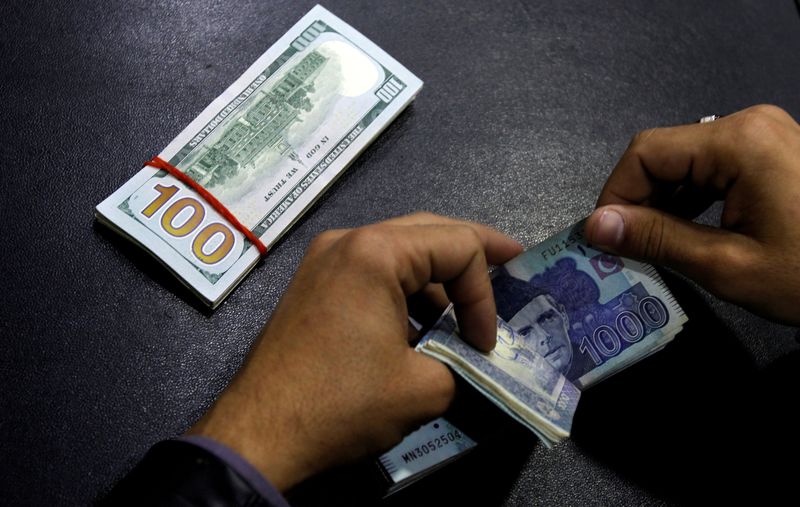By Syed Raza Hassan and Asif Shahzad
KARACHI, Pakistan (Reuters) -The likely new finance minister in crisis-hit Pakistan said on Monday he wanted a stable and strong rupee, which rose ahead of his formal appointment, and that he would like to pick up the economy where he left it during his 2017 tenure in the same job.
At that time, Ishaq Dar said Pakistan was going to become the world's 18th strongest economy, but the South Asian country is facing economic turmoil that has been exacerbated by widespread floods estimated to have cost it nearly $30 billion.
Dar will be taking office, for the fourth time, with the challenge of getting the economy out of one of its worst balance of payment crises that has seen foreign reserves falling to a month of imports.
The IMF board last month approved the seventh and eighth reviews of a bailout programme, allowing for a release of over $1.1 billion.
"Interest rate was lowest, the growth was highest, with the blessing of God, in decades, other macroeconomic indicators were excellent, reserves were highest, rupee was stable," Dar said on Monday of his 2013-17 tenure.
"So, we will be trying to get to that direction, that we stop the way the economy has been falling, and we change its direction."
The rupee rose 1.1% in interbank trading and over 3% in the open market after opening firmer in Monday's morning session as investors anticipated Dar's appointment, the state bank and forex exchange association said.
Dar has favoured a strong currency in his previous tenures as finance minister - from 1998-99, 2008 and 2013-17.
"God is sending me back to the same office," he said in a video statement telecast by local TV channels, referring to the finance ministry he quit after he flew to London in 2017 for medical check-ups amid pending corruption cases, which he says were politically motivated.
His arrest warrants have been suspended by an anti-graft court until Oct. 7, making his return to Pakistan possible.
Current Finance Minister Miftah Ismail said on Sunday he would quit - the fifth holder of the job to go in less than four years during persistent economic turbulence.
Government sources told Reuters he would be replaced by Dar, a member of Prime Minister Shehbaz Sharif's ruling party.
"The Dar factor is at play. There are memories of how he kept the dollar rate stable," Fahad Rauf at Ismail Iqbal Securities told Reuters.
"There is no way (the rupee) can sustainably move against the tide in the current scenario," Rauf said, in reference to the dollar strengthening against all currencies.
The rupee's latest gain could be mainly due to the fall in crude oil prices, a former Citigroup (NYSE:C) banker Yousuf Nazar told Reuters.
The ruling party has repeatedly said it inherited a wrecked economy from former Prime Minister Imran Khan, who was ousted in a vote of no-confidence in April - an accusation dismissed by Khan.
As the new government took over, the rescue programme with the IMF was in the doldrums because of a lack of an agreed policy framework.

Ismail said he pulled the country out of a near default, but markets did not respond positively, with the rupee tumbling to a record low and inflation crossing over 27%.
Unpopular decisions Ismail took to adhere to the IMF preconditions, including rolling back power and fuel subsidies given by Khan in his last weeks in power, saw inflation rise above 27% and the rupee tumbling to historical low.
(Writing and reporting by Asif Shahzad in Islamabad; Editing by Andrew Heavens and Nick Macfie)